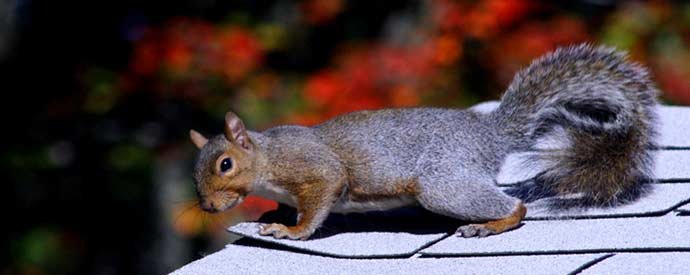What Damage Can Squirrels Do In The Attic?

Animal control is an important service to have, especially if there are squirrels in the area. Squirrels belong to the same rodent family as mice and rats, and they can cause similar damage. A squirrel can cause daily damage to a house or commercial building by chewing wiring and building materials, to name a few examples. If any of the following damage is discovered, contact squirrel and animal control as soon as possible.
Squirrels have evolved into creatures capable of entering a home or business through the tiniest crack or hole. If they can’t get in, they’ll chew through roof shingles, house siding, and a variety of other materials. Squirrels will continue to chew through insulation, wood, and other building materials once inside a structure.
Learn More: Common Squirrel Exclusion Questions
Chewed Electrical Wires
Squirrels and other rodents must manage the length of their teeth and the rate at which they grow. Too long teeth make chewing difficult, so squirrels constantly chew on things to keep the length of their teeth in check. Chewing strengthens and sharpens a squirrel’s teeth, allowing it to chew on acorns and other hard foods. Squirrels dull their teeth by chewing on wood, electrical wires, and other hard objects found in attics.
When a squirrel chews on electrical wires, it can cause residents problems and even put their lives in danger. Electrical wires that have been damaged can split and cause power outages. Electrocution can occur when a person comes into contact with chewed electrical wires, resulting in serious injuries or death. Electrical wires that have been damaged can also cause a fire. Dry, flammable materials, such as insulation, boxes, and wood beams, are commonly found in attics and can fuel a fire.
Torn Up Insulation
Squirrels may cause a lot of damage to the insulation in your attic. They will trample, push, and pile insulation throughout your attic as part of their nesting habits, clearing entire sections down to the vapor barrier. Squirrels will also shred and move insulation into your soffits, preventing proper airflow to the attic and potentially causing mold. Maintaining a habitable temperature inside your home requires a thick, even layer of insulation in your attic. The cost of heating and cooling you’re home will skyrocket if your attic insulation is ineffective.
Damage To Stored Items
Squirrels prefer to build their nests out of soft materials. Clothing, blankets, and even books provide very comfortable nesting material for squirrels. Squirrels frequently build nests in chimneys and attic vents. The cramped, dark spaces are eerily similar to hollow trees, where they prefer to nest in the wild. Unfortunately, a squirrel nest is essentially a large pile of flammable materials, and when built-in vents or chimneys, it poses a serious fire hazard.
Squirrel Droppings And The Spread Of Disease
If a squirrel comes into your home or business to build a nest, they may bring with them harmful parasites. Ticks, which can transmit Lyme disease, and fleas are among them. Salmonellosis can be found in accumulated squirrel feces and urine. Nausea, vomiting, diarrhea, fever, and chills may occur as a result of accidental exposure.
A few less common squirrel diseases include tularemia and leptospirosis. Because squirrels transmit pathogens through bites, most people are unlikely to become infected. Because these pests tend to flee and avoid humans, the chances of spreading these diseases are slim.
It’s also worth noting that while all mammals can contract rabies, small animals like squirrels rarely live long enough to spread the disease. If you find a dead or sick squirrel in your attic, do not approach or touch it.
How To Repair Squirrel Damage?
Repairs can’t begin until all wildlife has been removed from the attic. Contact animals happen for professional pest removal technicians that can ensure proper and complete removal. The next step is to identify the type of damage that has occurred. A wildlife removal company can repair structural and feces damage, but a licensed electrician should repair damage such as chewed electrical wires.
